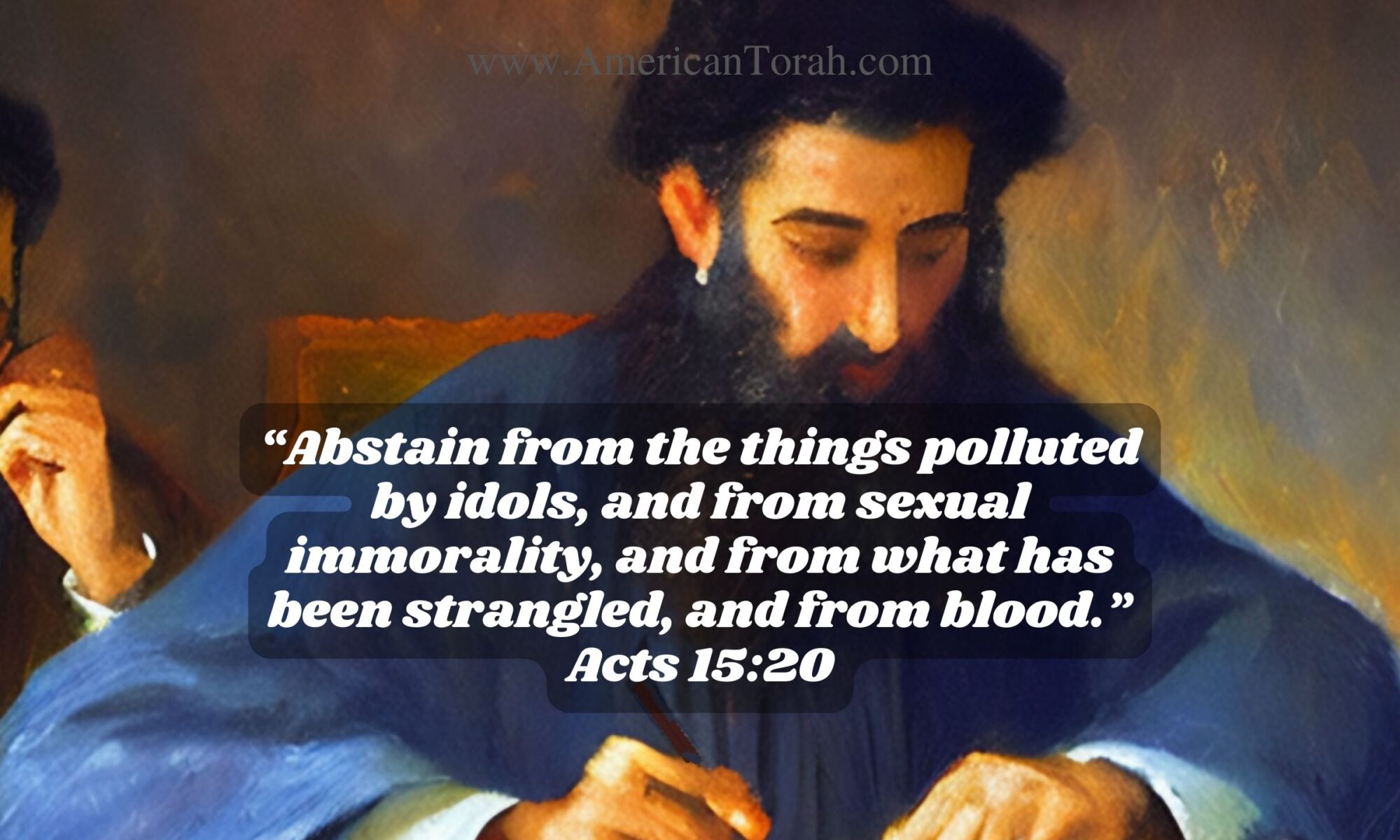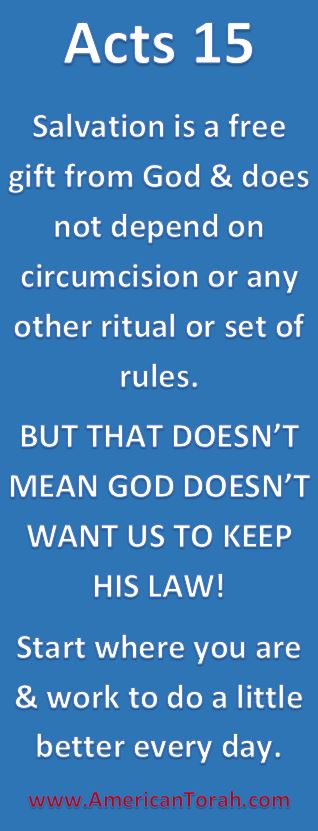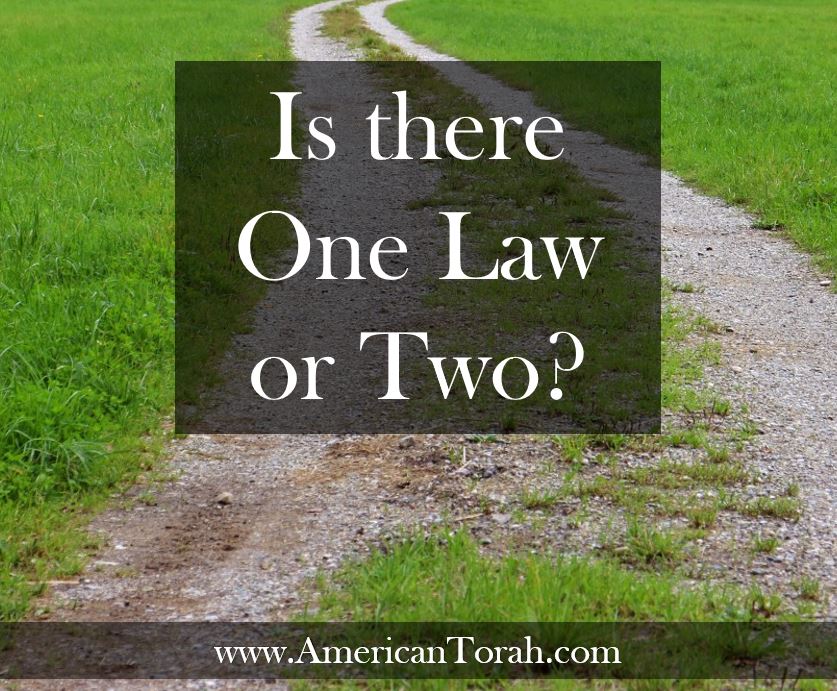
I teach that there is one Law for all citizens of the Kingdom of Heaven, that those who have been grafted into Israel are subject to the same statutes and moral standards as those who were born into Israel. One common–and reasonable–objection is that if the law didn’t apply to gentiles prior to Yeshua’s incarnation, why should it apply after? Wouldn’t that mean a change in the Law itself?
For now, I’m going to set aside the distinction between such terms as Jews, Israelites, and Church. It’s an important distinction, but I’ll get to that in a separate article. In this article, I use the term “Jew” as shorthand for the people known as Jews in the time of Jesus and their heirs, because that’s how the term is used in the Apostolic writings.
If I wrote of every scriptural evidence that the Law applies to more than only the Jews, I would have to write a book. But then if I had the time to write a book, it would have to be a different one. So I’ll settle for a handful of evidences.
Evidence 1: Romans 3:9-11,19-21 (9) What then? Are we Jews any better off? No, not at all. For we have already charged that all, both Jews and Greeks, are under sin, (10) as it is written: “None is righteous, no, not one; (11) no one understands; no one seeks for God… (19) Now we know that whatever the law says it speaks to those who are under the law, so that every mouth may be stopped, and the whole world may be held accountable to God. (20) For by works of the law no human being will be justified in his sight, since through the law comes knowledge of sin. (21) But now the righteousness of God has been manifested apart from the law, although the Law and the Prophets bear witness to it…
The phrase “under the Law” does not refer to those who are obligated to obey it, but to those who have violated the Law and are therefore under its judgment. The Law testifies against the sinner, thereby making him accountable for his sins. Paul wrote that “both Jews and Greeks are under sin.” But how can a Greek be “under sin” apart from the Law if, as Paul also wrote, “through the Law comes knowledge of sin?” He did not write, “Through one law comes knowledge of sin to the Greeks and through another Law comes knowledge of sin to the Jews.”
Some will say that there are two different laws at work here, one for the Jew and one for the Greek. Don’t let the necessary improvisations of the English translators fool you. The same Greek word nomos was translated as law in every case, and there was no capitalization or punctuation in the Greek. Every use of nomos in this passage refers to the same Law as verse 21 makes clear. There is one Law for both Jew and Gentile.* The Israelites were only the vehicle through which God gave his Law. Verse 2 says that they were entrusted with the oracles (utterances or revelations) of God, not that they were the only people to whom those oracles were addressed. If it’s still not clear enough to you, read the next two verses:
Romans 3:22-23 (22) …the righteousness of God through faith in Jesus Christ for all who believe. For there is no distinction: (23) for all have sinned and fall short of the glory of God,
There is no distinction between Jew and Greek in our guilt before the same Law, just as there is no distinction in our salvation through faith.
Evidence 2: Galatians 3:8-14 And the Scripture, foreseeing that God would justify the Gentiles by faith, preached the gospel beforehand to Abraham, saying, “In you shall all the nations be blessed.” (9) So then, those who are of faith are blessed along with Abraham, the man of faith. (10) For all who rely on works of the law are under a curse; for it is written, “Cursed be everyone who does not abide by all things written in the Book of the Law, and do them.” (11) Now it is evident that no one is justified before God by the law, for “The righteous shall live by faith.” (12) But the law is not of faith, rather “The one who does them shall live by them.” (13) Christ redeemed us from the curse of the law by becoming a curse for us–for it is written, “Cursed is everyone who is hanged on a tree”– (14) so that in Christ Jesus the blessing of Abraham might come to the Gentiles, so that we might receive the promised Spirit through faith.
Although I would like to focus on verse 13, I copied much more of this passage to give you a good idea of the context. The Letter to the Galatians was not written to Jews, but to Galatians. They were Gauls, Greeks, Romans, and other mixed gentile nuts. There were probably some Jews there too, but they weren’t Paul’s primary audience. Paul warned this mixed multitude of new believers against relying on the Law for their salvation, so we can be sure that he meant the Law of Moses. He told them that Yeshua set them free from the curse of that Law, but if the Law did not apply to the Gentiles of Galatia, how did they come to require salvation from its curse? Of course, the Law did apply to them. It wasn’t given only to be a witness against the Jews, but against the whole world! (See Romans 3:19.)
Evidence 3 & 4: 1 Timothy 5:18-19 For the Scripture says, “You shall not muzzle an ox when it treads out the grain,” and, “The laborer deserves his wages.” (19) Do not admit a charge against an elder except on the evidence of two or three witnesses.
These are just two examples among many of Paul’s teaching of Torah to Gentiles. To what scriptures was Paul referring? Deuteronomy 25:4 and Deuteronomy 19:15. Since Torah doesn’t apply to Gentiles, why would Paul burden them with its instructions? His words make good sense, of course, but Paul explicitly founded his advice in the Law. He would later write to Timothy that all of scripture, including the Torah, is worthwhile to study and to teach. All of it. And going by Paul’s example, it’s not just good to study, it’s good to do.
Just ask James:
Evidence 5: James 1:22 But be doers of the word, and not hearers only, deceiving yourselves.
James 4:11 Do not speak evil against one another, brothers. The one who speaks against a brother or judges his brother, speaks evil against the law and judges the law. But if you judge the law, you are not a doer of the law but a judge.
James was specifically addressing the Twelve Tribes in Diaspora, so this doesn’t directly counter the original objection. But if the objection is correct, and Christians have no responsibility to keep the Law at all, then they should remove this letter from their Bibles altogether because it wasn’t addressed to them anyway. All this talk of law would probably only confuse them. On the other hand, I know that many people teach believing Jews that they must abandon Torah when they come to faith in Yeshua. James, the head of the church in Jerusalem, obviously disagreed. Faith in Yeshua (aka Jesus) does not abrogate the responsibility to keep the Law, but rather establishes obedience as effectual for the holiness of all believers.
Evidence 6: 1 John 3:4 Everyone who makes a practice of sinning also practices lawlessness; sin is lawlessness.
John, in addressing some common early heresies, defined sin as living without the Law. One could object that John meant living without any law and not specifically the Law of Moses, but I think that seems a little silly after Evidences 1-5. I think we can all agree that he wasn’t talking about Roman civil law or Jovian ecclesiastical law.
I have already gone beyond the “handful” of evidences I intended, but I really should add a few from the older scriptures for the benefit of any Jews who might be following along.
Evidence 7: Isaiah 56:1-7 Thus says the LORD: “Keep justice, and do righteousness, for soon my salvation will come, and my righteousness be revealed. (2) Blessed is the man who does this, and the son of man who holds it fast, who keeps the Sabbath, not profaning it, and keeps his hand from doing any evil.” (3) Let not the foreigner who has joined himself to the LORD say, “The LORD will surely separate me from his people”; and let not the eunuch say, “Behold, I am a dry tree.” (4) For thus says the LORD: “To the eunuchs who keep my Sabbaths, who choose the things that please me and hold fast my covenant, (5) I will give in my house and within my walls a monument and a name better than sons and daughters; I will give them an everlasting name that shall not be cut off. (6) “And the foreigners who join themselves to the LORD, to minister to him, to love the name of the LORD, and to be his servants, everyone who keeps the Sabbath and does not profane it, and holds fast my covenant– (7) these I will bring to my holy mountain, and make them joyful in my house of prayer; their burnt offerings and their sacrifices will be accepted on my altar; for my house shall be called a house of prayer for all peoples.”
This is just about as plain a statement as you could want. Those non-Israelites who join themselves to God must never say that they are separated from his people, the Israelites. Just as Paul would write hundreds of years later: under God there is no difference between Jew and Greek. If gentiles worship the true God and keep his commandments, then they will be invited into his house. The implication is that, if they do not keep the Sabbath, they will not be invited, and their offerings and sacrifices will not be accepted.
Perhaps this is why David wanted to teach God’s Law to everyone. He was a man after God’s own heart, after all.
Evidence 8: Psalm 119:46-47 I will also speak of your testimonies before kings and shall not be put to shame, for I find my delight in your commandments, which I love.
Although he used two words, “testimonies” and “commandments”, the context indicates he meant them to be synonyms. If you aren’t as sure as I am, that’s understandable. Look a little further into Psalm 119, and maybe you will be convinced.
Evidence 9: Psa 119:118-119 You spurn all who go astray from your statutes, for their cunning is in vain. All the wicked of the earth you discard like dross, therefore I love your testimonies.
David wrote that God spurns all who go astray from his statutes. Not just the Israelites or the Jews. “All the wicked of the earth.” Since he did not want to be spurned, discarded like dross, he chose to love God’s testimonies. These lines are even clearer than the previous ones that “testimonies” was used synonymously with “commandments” and “statutes” throughout Psalm 119, and that all three apply to gentiles as well as to Jews.
Appropriately enough for the topic, I will conclude with a tenth scriptural evidence that the Law of God applies to all people, though there are many more to be found.
Evidences 10: Zechariah 14:18-19 And if the family of Egypt does not go up and present themselves, then on them there shall be no rain; there shall be the plague with which the LORD afflicts the nations that do not go up to keep the Feast of Booths. This shall be the punishment to Egypt and the punishment to all the nations that do not go up to keep the Feast of Booths.
Sukkot (the Feast of Booths) memorializes Israel’s time in the wilderness and prophesies of the coming of the Messiah. One could spiritualize this passage to avoid the issue–and the allegorical interpretation might not be entirely incorrect–but the literal meaning is quite clear. The day will come when any nation on earth that does not keep Sukkot will also not receive rain.
Sukkot, which means “tabernacles” or “booths”, is a festival that happens every Fall. It memorializes the time that Israel spent wandering in the wilderness living in sukkot and is the most likely time when Yeshua was born, hence the prophecies of the Messiah coming to tabernacle among his people. The manger probably wasn’t a feeding trough, but a tabernacle, a temporary shelter constructed in obedience to the command to live in sukkot for one week every year. Although it isn’t kosher by rabbinic standards, we set up our tents in the yard every year and try to sleep in them as much as possible for that week.
So, keep Torah (the Law) or not. Just don’t say that God never intended for non-Jews to keep it. The Apostles disagree.
*Be careful not to conflate the Sinai Covenant with the Law itself. The Law was included in the Covenant–Jeremiah says that the New Covenant also includes the Law–but it isn’t identical with the Covenant.


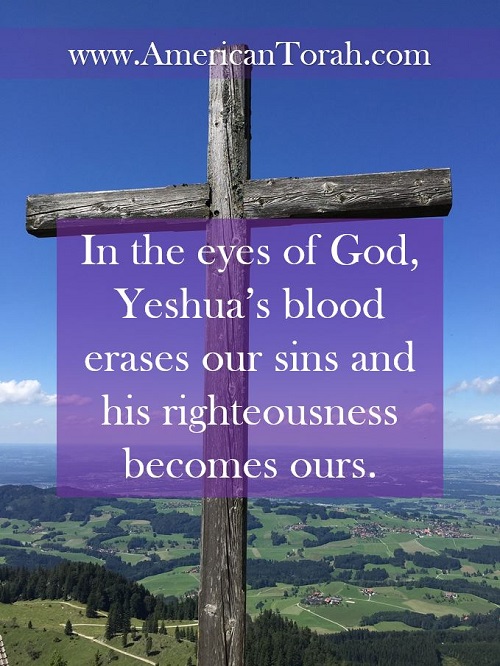 Someone on Twitter recently told me that he is still not sure why the Messiah needed to die. My reply (brief due to the limitations of Twitter) was something like this:
Someone on Twitter recently told me that he is still not sure why the Messiah needed to die. My reply (brief due to the limitations of Twitter) was something like this:
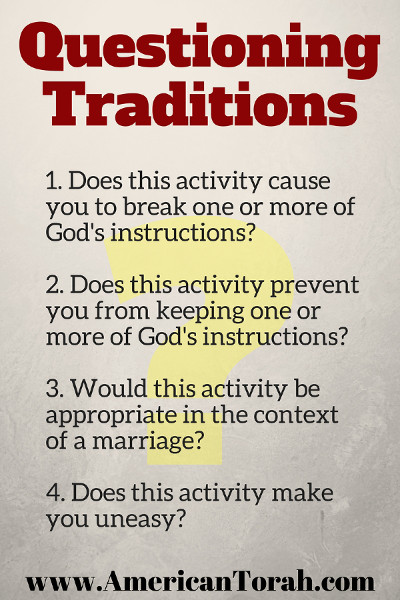 I recommend asking yourself a few simple questions to determine if any tradition or habit or activity is something you need to stop:
I recommend asking yourself a few simple questions to determine if any tradition or habit or activity is something you need to stop: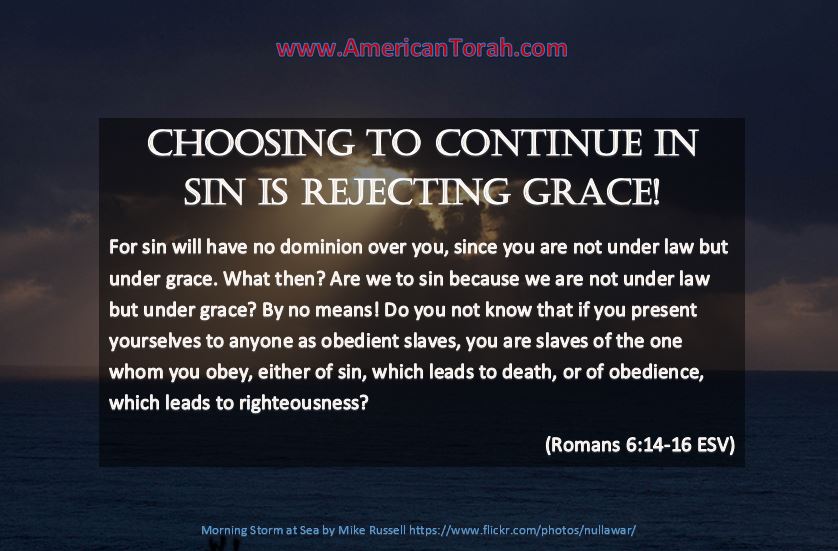
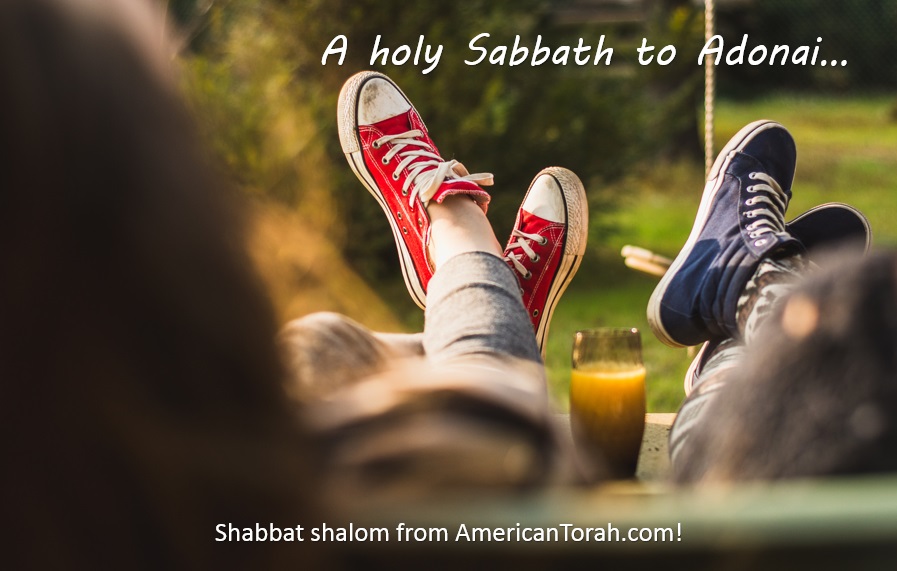

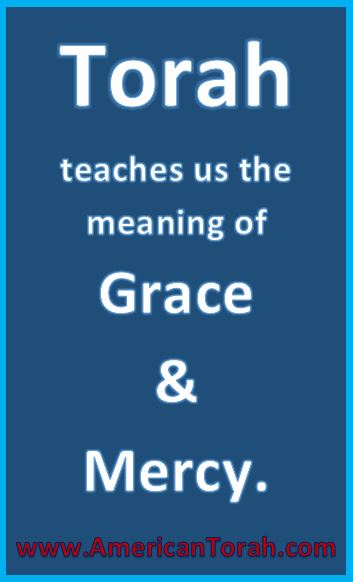 God wants us to keep His law, but He doesn’t expect perfection. He never did or else Torah1 wouldn’t include instructions for handling missteps. You will fail, but it will be OK in the end if you trust in God. That doesn’t mean obedience is optional. Knowingly disregarding what God has told you to do is the same as rejecting God himself. Either He is King or He isn’t.
God wants us to keep His law, but He doesn’t expect perfection. He never did or else Torah1 wouldn’t include instructions for handling missteps. You will fail, but it will be OK in the end if you trust in God. That doesn’t mean obedience is optional. Knowingly disregarding what God has told you to do is the same as rejecting God himself. Either He is King or He isn’t.